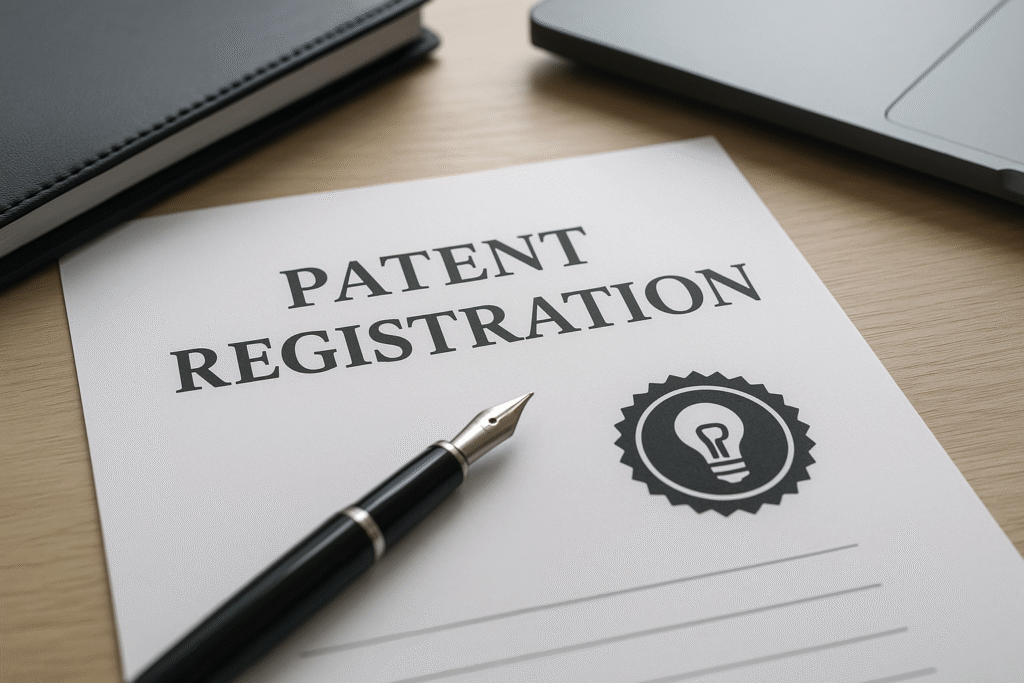Patent Registration
Securing your innovations is vital to the creative process, and registering a patent plays a fundamental role in safeguarding your intellectual property. Whether you work individually, lead a startup, or operate a substantial firm, understand how to apply for a patent in India is pivotal. This expansive guide walks you through the various parts of patent and registration methods, the function of patent experts, and how to access the Indian Patent Office Register for current information.

What Does Patent Registration Imply?
Patent registration is the lawful system by which an inventor secures exclusive patent rights for their invention. Once a patent is granted, it grants the innovator control over how their creation is utilized, made, or offered for a specific timeframe, typically 20 years. This promotes innovation by granting inventors a temporary monopoly in exchange for public disclosure of their invention.
Why Register a Patent?
When you apply for a patent, you gain a lawful privilege to stop others from making, utilizing, offering, or importing your innovation without your assent. It ensures your work from rivals and can altogether build the business esteem of your mental property.
Patent and Registration – Key Concepts
The process of patent and registration includes a few fundamental advances:
Conducting a prior art search to ensure your innovation is novel.
Filing a provisional or finished patent application.
Undergoing assessment by the Indian Patent Office.
Responding to protests (if any).
Securing the patent grant and having it recorded on the Indian Patent Register.
Provisional Patent Registration
A provisional patent registration allows inventors to initially lay claim, allowing time to refine ideas before committing fully. This interim stage proves especially prudent in swiftly evolving industries where first-mover advantage holds significance. Provisional applications endure twelve months, within which a complete specification must be lodged. Though interim in nature, it establishes priority and affords leeway for improvement.
Electronically Expediting the Process
In recent years, online submission has become the preferred pathway for most initiators. The Indian government has streamlined their digital system through the Indian Patent Office’s electronic portal, enabling submitters to: file applications electronically without delay, monitor status from a distance, make secure payments remotely, and access records electronically whenever preferred. This digital approach has rendered protection more within reach, efficient, and transparent.
The Role of Professionals
Navigating patent law’s intricacies often demands the expertise of qualified specialists. Here registered patent legal counsel, attorneys, and agents come into play.
Patent Attorney Credentials
A patent attorney holds legal qualifications with specialized knowledge in intellectual property. In India, the term is sometimes used interchangeably with agents, though strictly only lawyers can be attorneys. Becoming a registered patent attorney involves being admitted to the Bar Council of India and having specialized knowledge in patent law.
Patent Agent Registration
An agent registered under the Indian Patents Act is authorized to represent applicants before the Indian Patent Office. To qualify for registration as a patent agent, candidates must: be an Indian citizen, hold a science, engineering or technology degree, and pass the Indian Patent Agent Examination. Once registered, their name is included in the Indian Patent Agent Register overseen by the Controller General of Patents, Designs and Trademarks.

Indian Patent Registry – Tracking Legal Standing
The Indian Patent Registry is the formal national record of all patents granted in India. Operated by the Indian Patent Office Registry.
It includes specifics like :
- Patent number
- Invention title
- Applicant and inventor names
- Application and publication dates
- Current legal standing of the patent
- Creators, companies
- legal professionals
Frequently refer to the Indian Patent Office Registry to: Verify if a patent is active, Check the assignment history, Confirm renewal status, Access published specifications. The registry is publicly accessible through the patent e portal, heightening openness and trust in the patent system.
Patenting Registration Services – Why You Require Them
Patent law can be highly nuanced and complex. Many creators opt to employ patent registration services to ensure their applications are properly prepared and meet legal standards. These services incorporate: Drafting patent specifications, Conducting novelty and freedom-to-operate searches, Submitting and prosecuting patent applications, Handling oppositions and revocations, Portfolio management and strategy. By working with registered patent attorneys or agents, you significantly raise the likelihood of successful patent approval and lessen the risk of rejection.
The Indian Patent Agent Registry
The Indian Patent Agent Registry is a listing of people authorized to submit patent applications and represent applicants before the Patent Office. You can search the register online to validate the qualifications of your chosen patent agent. Engaging with a registered professional ensures you’re working with someone skilled to deal with the intricacies of Indian patent law.
How to Access the Patent e Registry
The patent e registry is an online portal run by the Indian Patent Office that allows users to: Search granted patents, Check application status, Access bibliographic and legal status information, View complete specifications. To access it : Visit the official website of the CGPDTM, to access it.
Navigating the patent world requires skill and diligence. Within the Indian patent office’s comprehensive digital archives lies repositories of knowledge vital for innovators of all stripes. Whether scouting competitors, substantiating novel ideas, or monitoring one’s portfolio, the e-register proves an invaluable resource. With a simple application or document number, treasures are unlocked.
This tool benefits inventors launching their first provisional application with the same zeal as seasoned professionals ensuring due diligence. Deep within its virtual halls information awaits transforming strategies or validating visions. Whether starting the journey or well along, navigating the nuances secures success for businesses and their IP assets.
From initial filing to maintaining granted rights, the patent process demands structure and focus. Leveraging professionals experienced in Indian patent law ensures clarity throughout. Registered patent attorneys and agents provide confident guidance navigating requirements and timelines. For innovators ready to confidently protect their innovations, enlisting such representation paves the smoothest path to profitable realization of creative works.
In summary, understanding the ins and outs of India’s patent system, and aligning with advisors well-versed in its particulars, establishes the soundest foundation for supporting innovation both now and into the future. For those prepared to safeguard novel ideas, With expert patent support, your innovation can make a global impact.



